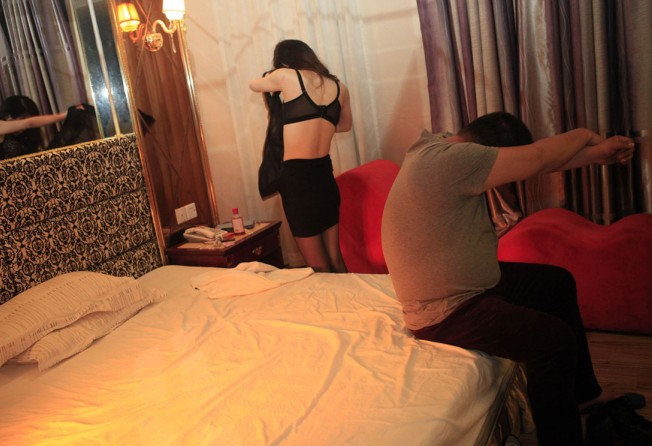Prostitution thrives as officials say one thing and do another
It's not the 'oldest profession' for nothing - the sex trade not only provides income to millions, its clients include the powerful

The word in the corridors of Chinese officialdom is that there are "some things you can do but never say and some things you can say but never do".
Prostitution belongs to the former. It is officially illegal on the mainland but prospers nonetheless in every part of the country.
In all cities and towns, large and small, prostitutes loiter around nightclubs, bars, karaoke rooms and massage parlours. Out on the street, skimpily dressed women are a common sight, sitting in the windows of hair salons and openly offering sexual services.
Even in the nation's political epicentre on Beijing's Changan Avenue, sex services are available in hotels and entertainment venues.
In economic terms, prostitution is a major industry in the same league as medicine and education, providing millions of jobs for its workers as well as services to its many more customers. That's why any development about it is news. It's no surprise, then, that a Xinhua report about the resumption of the sex trade in the Guangdong city of Dongguan last week made headlines nationwide.
Just five months after China Central Television ignited a large-scale crackdown with a report on Guangdong's "Sin City", Dongguan appears to be back in the world's oldest business. Global Times reported that some 1,134 entertainment venues, or nearly 70 per cent of those closed in the southern city during the crackdown, had reopened. That comprised 38 saunas, 465 karaoke parlours and 631 foot-massage centres. China Daily put the proportion at 80 per cent.
The news was enough to prompt state-run media to analyse whether Dongguan's municipal government was truly committed to the crackdown.
Indeed, the city authorities have long taken the "say but never do" attitude to the illegal industry, turning a blind eye for decades despite its high visibility. An estimated 300,000 prostitutes work in this city of seven million people.
The crux of the matter is that the sex trade is one of the pillars of the local economy, generating 50 billion yuan (HK$62.5 billion) or 10 per cent of Dongguan's 550 billion yuan gross domestic product last year.
That economic role was one reason that the central government's crackdown rebounded in unintended ways, triggering a rarely seen nationwide debate over whether the sex trade should be legalised.
Many of the arguments against legalised prostitution are grounded in ethics and morals. But advocates of legalisation counter that the activity occurs anyway and it makes sense to minimise its harm and maximise its gains through law.
The hard truth is that the industry is many people's bread and butter. Between four million and six million prostitutes ply their trade on the mainland, according to a 2010 World Health Organisation report. Some estimates say there are as many as 10 million sex workers in the country. In addition, there are millions working in related industries such as hotels, transport and catering.
Then there are the tens of millions of the sex trade's clients, many of whom are officials. Local officials avert their gaze to what happens in plain sight, despite the central government's campaigns against the industry.
Another factor at play is the millions of part-time prostitutes who make their way as mistresses to the wealthy and powerful in business and officialdom. If revelations from the cases of corrupt cadres are any guide, it is not uncommon for officials, particularly those higher up the power structure, to have at least one baoni, or "contracted prostitute".
Perhaps the central government's crackdown on prostitution is also part of President Xi Jinping's campaign to against graft and extravagance among officials, a mission also aimed at fostering socialist and Marxist orthodoxy to nurture clean governance and moral standards.